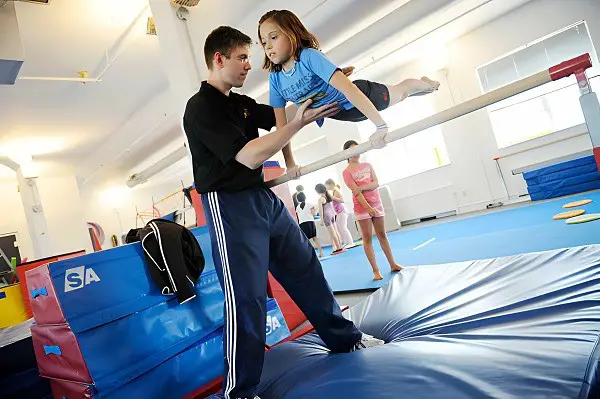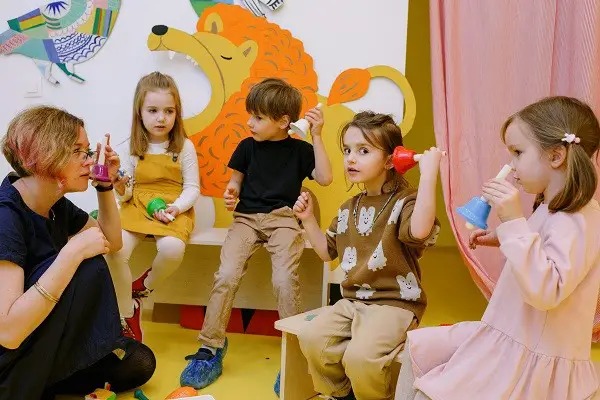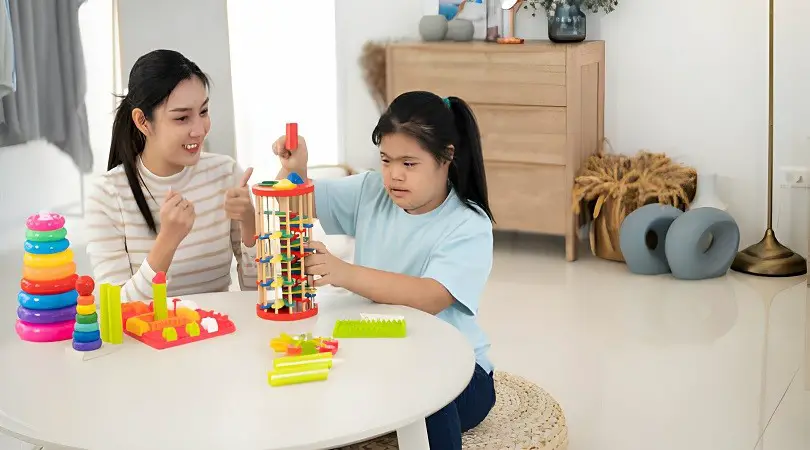Last Updated on January 6, 2025
Understanding your child’s developmental milestones is crucial for their growth and learning. It helps you track progress and identify any potential issues early on.
By recognizing typical developmental stages, you can provide appropriate support and encouragement as your child grows. As a parent, knowing what to expect at each stage of your child’s development can equip you with the insight to better nurture their skills and abilities.
From their first smile to their first steps and beyond, every milestone is a building block for their future. This guide will explore the key developmental stages and provide valuable tips to help you support your child’s growth and development effectively. Whether it’s cognitive, social, emotional, or physical milestones, being informed about your child’s development can pave the way for a healthy and happy journey into adulthood.

Importance Of Developmental Milestones
Understanding your child’s developmental milestones is crucial for their growth and well-being. These milestones act as guideposts, helping you track your child’s progress and ensuring they are meeting typical expectations in their physical, cognitive, and emotional development. Recognizing and celebrating these milestones can boost your child’s confidence and provide insight into their unique strengths and areas where they may need additional support.
Early Identification Of Potential Issues
By monitoring your child’s developmental milestones, you can detect potential issues early on. This early identification allows for timely interventions and support, minimizing the impact of any delays or challenges on your child’s overall development. Early intervention can make a significant difference in addressing developmental delays and setting the stage for positive outcomes in the long run.
Tracking Growth And Progress
Developmental milestones serve as a roadmap for tracking your child’s growth and progress. They create a framework for observing and understanding the changes and advancements your child experiences as they reach key developmental stages. This tracking provides valuable insights into your child’s development, enabling you to celebrate their achievements while also identifying areas where they may benefit from additional attention or resources.
Physical Milestones
Understanding your child’s physical milestones is an essential part of parenting. It helps you track their development and ensures they are on the right path. Physical milestones encompass motor skills development and growth patterns, which are crucial aspects of a child’s physical development.
Motor Skills Development
Motor skills development involves the progression of a child’s ability to control and coordinate their body movements. It includes both gross motor skills, which involve larger muscle movements, and fine motor skills, which involve smaller, more precise movements.
- Gross Motor Skills: These milestones involve actions such as rolling over, sitting up, crawling, standing, and walking. They are important for a child’s overall physical development and independence.
- Fine Motor Skills: These milestones include activities like grasping objects, using utensils, and eventually writing. They are crucial for tasks that require dexterity and precision.
Growth Patterns
Monitoring your child’s growth patterns is vital in understanding their physical development. Keep track of their height, weight, and head circumference to ensure they are growing at a healthy and steady pace.
| Age | Height | Weight | Head Circumference |
|---|---|---|---|
| 0-1 year | Increases rapidly | Doubles birth weight by 5-6 months, triples by 1 year | Grows rapidly |
| 1-2 years | Continued steady growth | Gain about 4-6 pounds per year | Gradual growth |
| 2-5 years | Growth slows down | Gain about 4-5 pounds per year | Gradual growth |
Cognitive And Emotional Milestones
Understanding your child’s cognitive and emotional milestones is crucial for their overall development. By knowing what to expect in terms of language acquisition, social development, and emotional growth, you can provide the necessary support and guidance to help your child thrive.
Lanaguage Acquisition
Language acquisition involves a child’s ability to communicate through words and understand language cues.
Social Development
Social development focuses on how a child interacts with others and forms relationships.
Here’s a breakdown of cognitive and emotional milestones:
| Milestone | Description |
|---|---|
| First Words | Your child starts to utter their first words, building the foundation for language development. |
| Imitating Sounds | Children mimic sounds they hear, enhancing their language skills. |
- Engage in imaginative play, showing understanding of pretend scenarios.
- Exhibit empathy and comfort peers when upset, indicating emotional awareness.
Key Milestones By Age Group

Understanding your child’s developmental milestones is crucial for parents to provide appropriate support and guidance as their little ones grow. Key milestones provide a foundation for monitoring your child’s progress and identifying any potential developmental delays. In this section, we will explore the key milestones for different age groups: infancy (0-12 months), toddlerhood (1-3 years), and preschool (3-5 years).
Infancy (0-12 Months)
During the infancy stage, your baby undergoes numerous remarkable milestones. From their first smile to their first steps, every achievement is a testament to their growth and development. Here are the key milestones you can expect during the first year of life:
- Building trust: Infants learn to trust their caregivers and develop a sense of security.
- Lifting their head: Around three to four months, babies achieve better head control.
- Sitting up: By the age of six to eight months, babies start sitting up without support.
- Crawling: Some infants begin to crawl between seven and ten months old.
- First words: Most babies start babbling and saying their first words at around nine to twelve months.
Toddlerhood (1-3 Years)
Toddlerhood is an exciting time when your child starts exploring the world around them more independently. Here are the key milestones to look out for during this stage:
- Walking and running: Most toddlers take their first steps between 12 and 15 months and then gradually become more confident walkers.
- Increasing vocabulary: Toddlers develop their language skills and begin to speak in simple sentences, expanding their vocabulary rapidly.
- Toilet training: Around the age of two, many toddlers begin to show readiness for potty training.
- Imitating others: Toddlers enjoy imitating the actions and behaviors of their caregivers and peers.
- Problem-solving: Toddlers start showing problem-solving skills, figuring out how to stack blocks or solve simple puzzles.
Preschool (3-5 Years)
The preschool years are a time of tremendous growth and development. Children become more independent, imaginative, and curious. Here are the key milestones you can expect during the preschool stage:
| Milestone | Description |
|---|---|
| Independent dressing | Children begin to dress themselves independently, including buttoning buttons and zipping zippers. |
| Imaginary play | Preschoolers engage in imaginative play, creating elaborate scenarios and fully immersing themselves in make-believe worlds. |
| Beginning to read | Many preschoolers start recognizing letters, understanding basic phonics, and showing an interest in books and reading. |
| Enhanced fine motor skills | Preschoolers refine their fine motor skills, allowing them to draw more detailed pictures and manipulate small objects with precision. |
| Improved social skills | Preschoolers become more adept at playing and interacting with their peers, learning to share, take turns, and communicate effectively. |
Supporting Your Child’s Development
As a parent, there are several ways you can support your child’s developmental milestones. Creating a stimulating environment and seeking professional guidance when needed are two important strategies that can make a significant difference in your child’s growth and overall well-being.
Creating A Stimulating Environment
One of the most effective ways to support your child’s development is by creating a stimulating environment that encourages exploration and learning. Here are a few tips to help you in this regard:
- Provide age-appropriate toys and activities that promote curiosity and problem-solving skills.
- Arrange the environment in a way that is safe yet challenging, allowing your child to explore and discover new things.
- Encourage open-ended play, which fosters creativity and imagination.
- Read books together and engage in interactive discussions to promote language development.
- Expose your child to various experiences and cultures to broaden their worldview.
Seeking Professional Guidance When Needed
While parents play a crucial role in supporting their child’s development, there may be instances where seeking professional guidance becomes necessary. Here are a few scenarios when you should consider reaching out to experts:
- If you notice persistent delays or regressions in your child’s developmental milestones.
- If you have concerns about your child’s speech and language development.
- If you suspect any sensory processing issues that may affect your child’s overall functioning.
- If you need assistance in understanding and managing your child’s behavior or emotional well-being.
- If you require guidance on appropriate educational interventions for your child.
Remember, seeking professional guidance can provide invaluable support and resources to address any concerns or challenges that may arise during your child’s development.
By creating a stimulating environment and seeking professional guidance when needed, you are taking proactive steps to support your child’s developmental milestones. These strategies can nurture their curiosity, enhance their abilities, and ensure they reach their full potential.
Frequently Asked Questions
What Are Some Important Developmental Milestones For Children?
Some important developmental milestones for children include walking, talking, and motor skill development.
How Can I Track My Child’s Developmental Milestones?
You can track your child’s developmental milestones by observing their behavior, consulting with pediatricians, and using milestone checklists.
What If My Child Is Not Meeting Their Developmental Milestones On Time?
If your child is not meeting their developmental milestones on time, it’s important to consult with a pediatrician to identify any potential issues and explore intervention options.
What Factors Can Affect A Child’s Developmental Milestones?
Various factors can affect a child’s developmental milestones, including genetics, environment, nutrition, parenting styles, and overall health and wellbeing.
What Can I Do To Support My Child’s Developmental Milestones?
To support your child’s developmental milestones, you can provide a nurturing and stimulating environment, engage in age-appropriate activities, and seek early intervention if needed.
Conclusion
Understanding your child’s developmental milestones is crucial for their growth and well-being. By observing and supporting their progress, you can foster a strong foundation for their future success. Stay engaged, celebrate achievements, and seek guidance when needed to ensure your child reaches their full potential.
Keep learning and adapting together!








